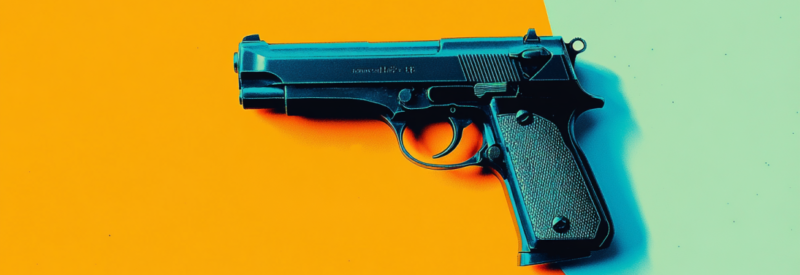According to recent reports, the U.S. Firearm industry contributed $51.3 billion to the economy in 2023.[1]Zippia. “30+ Striking U.S. Firearm Industry Statistics [2023]: How Big Is The US Gun Industry.” Accessed October 7, 2024. For entrepreneurs eager to tap into this market and create their own successful business plan, you’ll need to get a federal firearms license (FFL) to do so. Read on to learn more about how to get an FFL in Alabama.
Getting an Alabama FFL: An Introduction
The Bureau of Alcohol, Tobacco, Firearms, and Explosives (ATF) issues Federal Firearms Licenses. Having an FFL allows individuals or businesses in the United States to purchase, sell, manufacture, or transfer firearms commercially.
In this article, we will cover the cost associated with getting an FFL, the rules and regulations pertaining to an Alabama FFL specifically, and answer your frequently asked questions about FFLs. Let’s dive in.
Step 1: Meet All of the FFL Requirements
Before applying for an FFL, you must first make sure you are eligible for one. There are three tiers of requirements you’ll need to consider: federal, state, and local. Think of it like a cake: the federal requirements are the base layer, state requirements add a tier on top, and local requirements are the decoration. Each builds on the other to create the full picture of the FFL requirements based on your local area. Let’s go through each tier of the FFL requirements in Alabama specifically.

Federal requirements

As we mentioned, the ATF sets the country’s minimum requirements for applying for an FFL.[2]ATF. “Apply for a Federal Firearms License.” Accessed October 7, 2024. As such, they are pretty straightforward.
The federal requirements mostly pertain to the individual applicant and include things like:
- Personal eligibility to own a firearm
- 21 years of age or older
- Be a legal U.S. citizen or permanent resident
- Clean criminal history

State requirements
Each state can impose additional licensing and requirements that FFL applicants must abide by in order to get an FFL and operate a business in that state. Luckily, Alabama is a very gun-friendly state and has not implemented any additional state licensing requirements.
The only additional piece of paperwork you will need to do in Alabama for an FFL is to register your business.[3]Alabama.gov. “Register an Entity – Alabama Department of Revenue.” Accessed October 7, 2024. Whether your business is new, established (and switching locations), or you inherit a business, you must ensure you register it within the state.

Local and zoning requirements
As we touched on, Alabama is a gun-friendly state, and that attitude continues at the local level. Alabama does not have any specific zoning or local requirements for starting your firearms business. However, that is not to say getting zoned for your new business will be easy. You’ll either need to find a location that’s already zoned for your business or make a good business plan to present a case for updating the zoning requirements.
Many times, getting properly zoned for your business is one of the hardest parts of getting your FFL. This especially applies when an individual is starting a home-based FFL. Because of these difficulties, it’s, again, important to provide a detailed business plan and speak with the zoning department about the type of business you are starting. Include pertinent details like the amount of foot traffic you expect, and so on. Many times, they initially deny a zoning application because of a simple misunderstanding. So, make sure you have all your ducks in a row when speaking with the zoning department, as it will help you with this part of the process.
Step 2: Select the Type of FFL You Need
Before deciding which type of Federal Firearms License, or FFL, your business needs, you should consider a few things:
- What type of firearm are you going to sell? Certain firearms will require a different level of FFL license.
- What type of business are you starting? Are you going to be selling firearms, importing firearms, or manufacturing them?
- What is the location of your business? Are you going to have a brick-and-mortar location, an online e-commerce store, or a home-based FFL?
All this will need to be considered before you start looking at what type of FFL your business will need.

FFL license types
There are nine different FFL licenses, and they are separated into three categories: dealer, manufacturer, or importer. No matter what you choose, you will find the FFL you need on this list.
Step 3: Complete an Online FFL Course
Taking an online FFL course in Alabama is an important step toward becoming a firearms dealer. We recommend a high-quality course for anyone hopeful of getting involved with the firearms industry.
It’s beneficial to be well-versed in local, state, and federal laws pertaining to the field. This includes things like commercial storage requirements, background check procedures, and record-keeping processes. Having this base level of understanding will help you start your business and hit the ground running with a lot less fumbling along the way.
An online FFL course offers a great overview for someone who is just starting out and can help you acquire important knowledge that would otherwise take a lot of time and practice to learn. Although taking a course is highly recommended, it is not legally required. Having a good understanding of the rules and regulations surrounding your business venture is essential, so it’s important to take advantage of all resources available to arm yourself with the best possible information.
Step 4: Apply for Your Alabama FFL
Once you have everything you need, it’s time to submit your FFL application to the Bureau of Alcohol, Tobacco, Firearms and Explosives. Along with your completed application, you will need to supply the ATF with fingerprints and a picture for your application. Once you have submitted your application, you should have your decision on your application within 60 days.
Step 5: Have an Interview with a Representative From Your Regional ATF Office
Once the ATF has received your application, within that 60-day decision window, they will arrange a meeting with your regional ATF office. An Industry Operations Investigator (IOI) will conduct a visit and chat with you about your business plan. The point of meeting with the IOI is so they can review your business and business model and make sure you have a clear understanding of state and federal laws.
FFL License Costs in Alabama
FFL license costs can vary depending on the category, but they will not vary from state to state. Like the federal FFL requirements, the ATF also regulates the costs. You can find the cost of each FFL by type on the ATF website.
It’s good to note that each FFL is valid for three years, and each renewal is also valid for a three-year period.
Getting a Federal Firearms License in Alabama: Closing Thoughts

With so much support for gun rights in Alabama, getting an FFL is even easier than in most other states. Knowing the law concerning this business can help set you apart. Getting a federal firearms license (FFL) in Alabama is a great way to jumpstart your career in the art of gunsmithing, firearm sales, and ammunition. The process itself is straightforward. Once your application gets approved, you can begin receiving firearms from distributors at wholesale pricing levels.
The next step after getting an FFL is to find a gun-friendly payment processor to start accepting payments. Fortunately, we specialize in working with high-risk businesses like you. We provide top-tier, white-glove service with dedicated support to help your business thrive. Reach out today to see what we can do for you!
High-Risk Businesses Wanted
Your troubles of getting approved are over!
Approval
Rating
FFL Alabama FAQs
Do I need an FFL in Alabama?
Yes, you will need an FFL in Alabama if you plan to take part in commercial firearms manufacturing, importing, or dealing. An FFL is essential in all 50 states to take part in the firearms industry.
Who can apply for an FFL in Alabama?
Anyone personally eligible (based on the aforementioned federal requirements) can apply for a federal firearms license in Alabama. Since Alabama has not implemented any additional state-level licensing requirements, the only true barriers to an FFL in the state are the relatively simple federal regulations and a properly zoned business location.
Do I need to register as a business to get an Alabama FFL?
Yes, you will need to have a registered business in Alabama to apply for an FFL. Even if you have an existing business in another state, you will need to re-register or register as a new entity if you are newly operating in the state of Alabama.
How can I find an FFL dealer in Alabama?
Finding an FFL dealer in Alabama is relatively simple. The best place to start is by checking the official website of the Bureau of Alcohol, Tobacco, Firearms and Explosives (ATF). They have a list of available FFL dealers in every state, including Alabama.
Additionally, if there is a local gun shop or range in your area, you should be able to find one by asking for recommendations there. While searching online is the fastest option, some people prefer to use more traditional methods like word-of-mouth or asking other gun owners they know. This can also be a good way to find FFL dealers located nearby as well as get firsthand reviews from past customers who can provide valuable insight into which dealers are reliable.
Can you have a home-based FFL in Alabama?
Yes, home-based FFLs are completely legal in Alabama. However, home-based FFLs have proven to be difficult (in any state) to get proper zoning, but officially, there are no laws that would restrict you from opening a home-based FFL.
Can I apply for an FFL with an Alabama gun trust?
Unfortunately, no. If you are getting into the firearms industry, you must go through the entire FFL application process. A gun trust is not an individual and, therefore, cannot apply.
Does the BATF&E have requirements for an FFL in Alabama?
Yes, the BATF&E (Bureau of Alcohol, Tobacco, Firearms, and Explosives), also known as the ATF, is the federal organization that manages federal firearms licenses. In other words, the ATF sets all of the federal requirements, regulates the license costs, and sets the license types.
Do I need to apply for an SOT for my Alabama FFL?
Becoming a SOT will only be necessary if you plan to deal with NFA items. Below is a list of what an NFA item looks like:
- Silencers/suppressors
- Machine guns
- Short-barreled rifles
- Short-barreled shotguns
- Grenades, mines, bombs, etc. (destructive devices)
In other words, you’ll need to become a special occupancy taxpayer (SOT) if you’re dealing with federally regulated weapons like the above.
How long does it take to get your FFL in Alabama?
The FFL process will depend on each person’s experience. Putting together a detailed business plan and getting the proper zoning can take time, but it should be easier in Alabama than in most states. Once you’ve submitted the application, it should take 60 days to get a response.
How can I transfer an FFL in Alabama?
You cannot transfer an FFL in Alabama. Anyone who wishes to be part of the firearms industry must go through the FFL application themselves.
How much does an FFL transfer cost in Alabama?
The cost will vary depending on the dealer, type of weapon, and complications specific to the transaction (for example, if you need modifications made to make a gun from one state legal in another). All factors considered, it can cost anywhere from $10-$100 to transfer a weapon through an FFL dealer.
How hard is it to get an FFL in Alabama?
Getting an FFL in Alabama is about as easy as it gets. Alabama has not implemented any additional state-level licensing, and there are no local laws regulating firearm sales.




